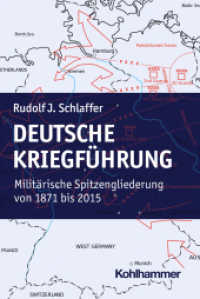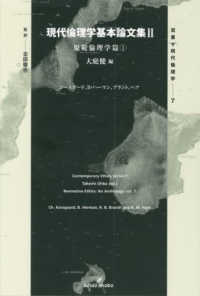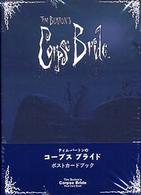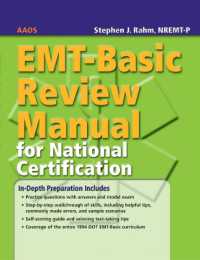Full Description
This detailed volume provides a comprehensive collection of methods and protocols in food allergy and food allergens studies. The selected protocols explore the study of food allergens, from recombinant production, purification procedures, IgE and T cell epitopes characterization, to allergen structure description, cellular responses, and tolerance induction, through a variety of techniques and animal models. Written for the highly successful Methods in Molecular Biology series, chapters include introductions to their respective topics, lists of the necessary materials and reagents, step-by-step and readily reproducible laboratory protocols, as well as tips on troubleshooting and avoiding known pitfalls.
Authoritative and practical, Food Allergens: Methods and Protocols serves as an ideal reference for scientists at all stages involved in the study of food allergy and allergenic components.
Contents
Food Allergens of Plant and Animal Origin: Classification, Characteristics, and Properties.- Purification of Food Allergens from Their Natural Sources: Chromatographic Methods.- Recombinant Production of Food Allergens in Yeast Pichia pastoris.- Yeast Surface Display Methodology for the Characterization of Food Allergens In Situ.- Characterization of Linear IgE-Binding Epitopes in Food Allergens.- Characterization of T-Cell Epitopes in Food Allergens by Bioinformatic Tools.- Phage Immunoprecipitation Sequencing (PhIP-Seq) for Analyzing Antibody Epitope Repertoires against Food Antigens.- 1D-, 2D-Gel Electrophoresis, Immunoblotting, and Enzyme-Linked Immunosorbent Assay (ELISA) for the Study of Food Allergens.- Preparation of Blinded Food Matrixes for Clinical Oral Challenges.- Structural Characterization of Food Allergens by Nuclear Magnetic Resonance Spectroscopy.- Co-Culture of Human Dendritic and T Cells for the Study of Specific T Cell-Mediated Responses against Food Allergens.- Evaluation of the Suppressive Capacity of Regulatory T Cells in Food Allergy Research.- Mass Cytometry in Food Allergy Research.- Indirect Basophil Activation Test for Peanut Allergy Diagnosis Using Human Donor Basophils.- Standardization of Food Allergen Measurements Using Multiplex Array Technology.- Biosensors for the Detection of Food Allergens.- Standardization of a Mass Spectrometry-Based Workflow for Food Allergen Quantification.- Identifying Similar Allergens and Potentially Cross-Reacting Areas Using Structural Database of Allergenic Proteins (SDAP) Tools and D-Graph.- Validation Procedures for Quantification of Food Allergens by Enzyme-Linked Immunosorbent Assay (ELISA).- Detection of Bet v 1 Homologous Proteins and Plant Profilins by Indirect ELISA.- A Mouse Model of Shrimp Allergy with Cross-Reactivity to Crab and Lobster.- Animal Models in the Study of Food Allergens: Long-Term Maintenance of Allergic Reactivity in Mouse Models of Food Allergy.- Study of MicroRNAs Expression in Food Allergy.- De Novo Transcriptomic Analyses to Identify and Compare Allergens in Foods.- Chromatin Immunoprecipitation Sequencing (ChIP-Seq) Assay in Food Allergy Research.








